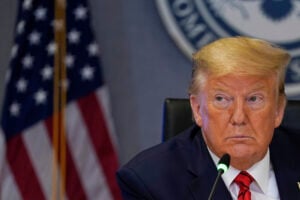Court Benchslaps Trump's Gambit To Postpone Carroll Defamation Suit. Again.
Rubber, meet road.

(Photo by Evan Vucci-Pool/Getty Images)
In February when Donald Trump’s lawyer Joseph Tacopina entered an appearance in the E. Jean Carroll defamation case, he vowed to put an end to delay tactics.
“If you say start tomorrow, I’ll be ready,” he promised Judge Lewis Kaplan, who granted a few days reprieve to resolve a witness issue, but warned that the trial would start on the 25th, “come hell or high water.”

Navigating Financial Success by Avoiding Common Pitfalls and Maximizing Firm Performance
Since then, Trump’s lawyers have lodged multiple requests for postponement, including two in just the past week. One of those, which made serious and apparently false allegations of ethical misconduct by Carroll’s lawyers, was swiftly batted away by the court. But Judge Kaplan, whose patience was long ago exhausted by Tacopina’s co-counsel Alina Habba, took his time crafting a response to the second request.
That letter motion, filed by Trump on Monday April 11, asked for a four-week “cooling off” period due to “the recent deluge of prejudicial media coverage” of Trump’s indictment by Manhattan District Attorney Alvin Bragg. It came less than 24 hours after Trump posted “WORLD WAR III!” on his social media platform, and one day before he sat for an interview with Tucker Carlson in which he discussed the criminal case.
“A short postponement of the trial will allow the recent surge in media coverage to subside and increase the likelihood that President Trump receives a fair trial,” his lawyers wrote, warning that it would be an “abuse of discretion” for the court to force their client to face defamation and sexual assault claims when the 34 counts of falsifying a business record charged by the DA pertain to “the same issue at the heart of this litigation.”
Was it wise on the eve of trial to invite the court to opine on the difference between the defendant’s merely adulterous conduct and the alleged sexual assault he perpetrated? Perhaps not. But once summoned, the court was prepared to weigh in:
Sponsored

Early Adopters Of Legal AI Gaining Competitive Edge In Marketplace

Is The Future Of Law Distributed? Lessons From The Tech Adoption Curve

Legal AI: 3 Steps Law Firms Should Take Now

Legal AI: 3 Steps Law Firms Should Take Now
Adulterous consensual sex, which is what allegedly occurred between Mr. Trump and Woman 2, while technically a (probably rarely if ever prosecuted) offense in New York, is a misdemeanor punishable by a maximum sentence of three months imprisonment and/or a fine of $500. Rape, which is what Mr. Trump allegedly did to Ms. Carroll, in contrast, is a serious felony punishable by a substantial term of imprisonment.
Duly noted!
Similarly, Judge Kaplan would never have brought up the multiple pending indictments hanging over the defendant’s head. But when asked, he will note for the record that “Mr. Trump faces a number of criminal and civil investigations and litigation” and “Developments in at least one of these matters, as well as actions and statements by Mr. Trump in relation to any, may well give rise to intense publicity.”
The court can’t very well postpone the trial every time Trump gets indicted — at that rate, it will never start!
And furthermore, the court tut-tuts that Carroll filed the instant action four years ago, and “it is difficult also to ignore the possibility that this latest eve-of-trial request for a postponement is a delay tactic by Mr. Trump, a concern the Court has discussed in previous rulings.”
Sponsored

The Business Case For AI At Your Law Firm


Navigating Financial Success by Avoiding Common Pitfalls and Maximizing Firm Performance
“There is no justification for an adjournment,” Judge Kaplan concluded this morning, adding, “The suggestion that the recent media coverage of the New York indictment – coverage significantly (though certainly not entirely) invited or provoked by Mr. Trump’s own actions – would preclude selection of a fair and impartial jury on April 25 is pure speculation.”
Which means that Trump will have to adhere to the Thursday deadline for both parties to inform the court whether and on which days they intend to attend the trial. Be there, will be wild — or in this case, probably not.
Carroll v. Trump I [Docket via Court Listener]
Carroll v. Trump II [Docket via Court Listener]
Liz Dye lives in Baltimore where she writes about law and politics and appears on the Opening Arguments podcast.







